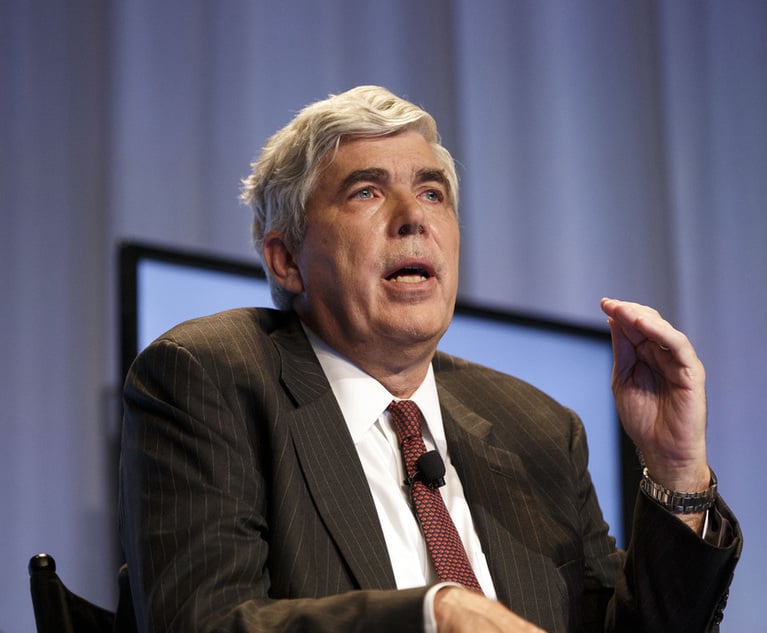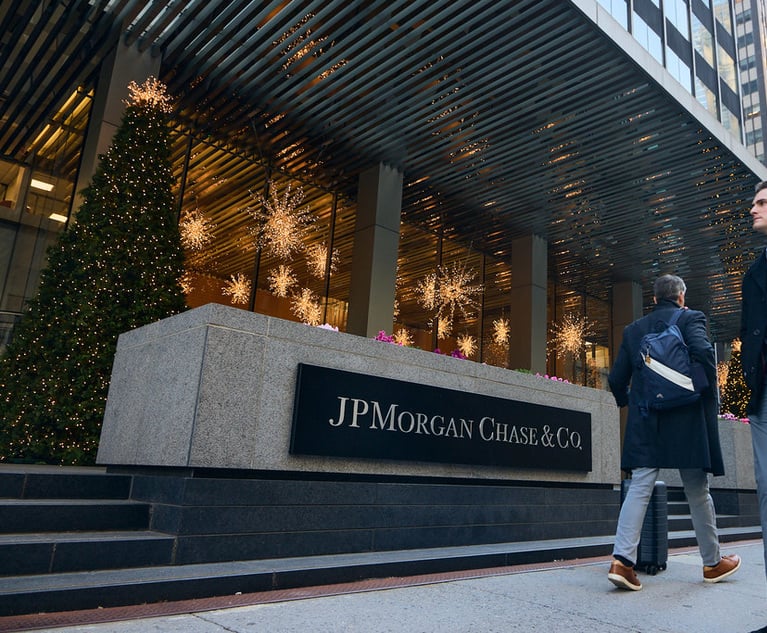Achieving Commercial Real Estate Success Post-Brexit
Post-Brexit, proper planning and ability to pivot will help American companies with UK, EU commercial property interests.
June 14, 2019 at 11:45 AM
6 minute read
 As the United Kingdom's exit from the European Union barrels ahead—pending any additional hiccups or delays—international business owners in New York and other American cities with interests in the UK or EU nations have been anxiously watching the proverbial train wreck that is Brexit and trying to ascertain its impact on their international operations.
As the United Kingdom's exit from the European Union barrels ahead—pending any additional hiccups or delays—international business owners in New York and other American cities with interests in the UK or EU nations have been anxiously watching the proverbial train wreck that is Brexit and trying to ascertain its impact on their international operations.
It is unclear exactly how the UK's departure will be executed and exactly what the impact on the international commercial real estate marketplace will be as government officials in the UK continue their struggle to map the country's exit, now set for October 31.
Yet global investments around the world continue to increase in tandem with steady economic and employment growth in key global markets, including Europe, despite Brexit, according to Deloitte's 2019 Commercial Real Estate Outlook. And, although most investors remain committed to the commercial real estate industry, some CEOs have expressed concern about the stability of a post-Brexit Europe and are focused on minimizing potential instability as it affects their companies.
Concerns include “a flattening yield curve, various country tax reform initiatives, the potential of trade tariffs in the United States, and the uncertainty around the impact of Brexit in Europe,” according to Deloitte.
One thing that remains clear is that Brexit's uncertainties have led many international companies to either leave the UK altogether and relocate to other cities in EU countries or open up additional offices in the EU to ensure access to the EU market post-Brexit, while some companies are securing access to the EU market post-Brexit via mergers and acquisitions.
Dublin, Ireland is the top choice of financial services companies relocating staff or operations from the UK, according to accounting giant Ernst & Young. In addition to financial firms, many other American companies, including law firms such as Tully Rinckey PLLC, are choosing to do businesses in Ireland because of its high upward potential and the fact that English is spoken there, which allows for easy communication. Additionally, Ireland's common law jurisdiction allows Americans to understand the market much better, knowing that that there is a large migration of highly skilled personnel and large companies moving from the UK to Ireland. Luxembourg, Paris, Frankfurt and Amsterdam are also top destinations that give American companies access to the EU marketplace.
Succeeding in these new locales is key and requires new ways of thinking as well as a sense of nimbleness. Entrepreneurs that understand that changes and disruption can actually create opportunities, and that possess the right business models, will be able to achieve success in a post-Brexit world. “To enhance agility … companies should innovate continuously and improve organizational fluidity rather than work within set guidelines and in silos. Running pilots of new products and services with a 'fail early, fail fast, learn faster' approach could allow them to learn from failures, develop better offerings, and/or discard the unviable ones,” Deloite's 2019 Commercial Real Estate Outlook suggests. “Ultimately, the winners will be those that can adapt to the forces of change faster than the speed of change itself.”
|Business in the UK Post-Brexit
Not all investors and existing UK companies are “spooked” by the UK's planned Halloween exit, and some see Brexit as more of an inconvenience than a threat to future business. UK-think tank New Financial called Brexit “a monumental pain in the balance sheet,” and noted, regarding financial firms in London, that the “industry has always been pragmatic and adaptable, and most firms in the City can and already have adapted to whatever form of Brexit we end up with by opening a new office in Dublin, Frankfurt or Paris, getting a new licen[s]e from the local regulator, and moving anything from a handful to a few hundred staff.”
But what about other companies whose investors chose to continue to do business—or launch new enterprises—in the UK? In its 2019 UK Real Estate Market Outlook report, global real estate advisor CBRE predicts a temporary Brexit-driven “turbulent” political scene could cause hesitation and delay related to property markets, businesses and consumers. CBRE anticipates that a reasonably comprehensive free trade agreement will eventually be reached, but a potential no-deal Brexit mixed with political uncertainty could lead to a gradually weakening global economic environment.
But probably not for long. Uncertainty around Brexit is expected to dampen investment through the second quarter of 2019, but could rebound near the end of the year as Brexit's unknowns decrease, according to CBRE.
Therefore, it makes sense to note that it is not merely one-way traffic exiting the UK. “[A] number of firms from outside the EU have opted to open new entities in the UK despite Brexit, and some EU firms that previously used branches or passporting to access the UK have already applied for authori[z]ation in the UK to ensure they retain that access,” according to a report by New Financial.
In fact, in addition to its first international office in Dublin, Tully Rinckey PLLC is planning to open a London office later this year. The firm originally slated London as its first international location, prior to the 2016 Brexit referendum in which 51.9 percent voted in favor of the UK leaving the EU, but backtracked to take time to evaluate potential impacts. Since, the firm effectively re-evaluated and changed its game plan to manage potential Brexit implications and is moving forward with its UK office.
How exactly the UK's departure from the EU will impact the international commercial real estate marketplace is not completely clear, but American companies that can respond to the changing marketplace and pivot or change course as circumstances necessitate, can achieve success in the soon-to-be post-Brexit world.
Mathew B. Tully is the founding partner of Tully Rinckey PLLC and Tully Rinckey Ireland. Partner Barry Crushell is Tully Rinckey Ireland's chief operating officer for European Operations.
This content has been archived. It is available through our partners, LexisNexis® and Bloomberg Law.
To view this content, please continue to their sites.
Not a Lexis Subscriber?
Subscribe Now
Not a Bloomberg Law Subscriber?
Subscribe Now
NOT FOR REPRINT
© 2025 ALM Global, LLC, All Rights Reserved. Request academic re-use from www.copyright.com. All other uses, submit a request to [email protected]. For more information visit Asset & Logo Licensing.
You Might Like
View All
Trump Mulls Big Changes to Banking Regulation, Unsettling the Industry


Trump's SEC Overhaul: What It Means for Big Law Capital Markets, Crypto Work
Trending Stories
- 1Courts, Lawyers Press On With Business as SoCal Wildfires Rage
- 2Florida, a Political Epicenter, Is the Site of Brownstein Hyatt's 13th Office
- 3Law Firms Close Southern California Offices Amid Devastating Wildfires
- 4Lawsuit alleges racial and gender discrimination led to an Air Force contractor's death at California airfield
- 5Holland & Knight Picks Up 8 Private Wealth Lawyers in Los Angeles
Who Got The Work
Michael G. Bongiorno, Andrew Scott Dulberg and Elizabeth E. Driscoll from Wilmer Cutler Pickering Hale and Dorr have stepped in to represent Symbotic Inc., an A.I.-enabled technology platform that focuses on increasing supply chain efficiency, and other defendants in a pending shareholder derivative lawsuit. The case, filed Oct. 2 in Massachusetts District Court by the Brown Law Firm on behalf of Stephen Austen, accuses certain officers and directors of misleading investors in regard to Symbotic's potential for margin growth by failing to disclose that the company was not equipped to timely deploy its systems or manage expenses through project delays. The case, assigned to U.S. District Judge Nathaniel M. Gorton, is 1:24-cv-12522, Austen v. Cohen et al.
Who Got The Work
Edmund Polubinski and Marie Killmond of Davis Polk & Wardwell have entered appearances for data platform software development company MongoDB and other defendants in a pending shareholder derivative lawsuit. The action, filed Oct. 7 in New York Southern District Court by the Brown Law Firm, accuses the company's directors and/or officers of falsely expressing confidence in the company’s restructuring of its sales incentive plan and downplaying the severity of decreases in its upfront commitments. The case is 1:24-cv-07594, Roy v. Ittycheria et al.
Who Got The Work
Amy O. Bruchs and Kurt F. Ellison of Michael Best & Friedrich have entered appearances for Epic Systems Corp. in a pending employment discrimination lawsuit. The suit was filed Sept. 7 in Wisconsin Western District Court by Levine Eisberner LLC and Siri & Glimstad on behalf of a project manager who claims that he was wrongfully terminated after applying for a religious exemption to the defendant's COVID-19 vaccine mandate. The case, assigned to U.S. Magistrate Judge Anita Marie Boor, is 3:24-cv-00630, Secker, Nathan v. Epic Systems Corporation.
Who Got The Work
David X. Sullivan, Thomas J. Finn and Gregory A. Hall from McCarter & English have entered appearances for Sunrun Installation Services in a pending civil rights lawsuit. The complaint was filed Sept. 4 in Connecticut District Court by attorney Robert M. Berke on behalf of former employee George Edward Steins, who was arrested and charged with employing an unregistered home improvement salesperson. The complaint alleges that had Sunrun informed the Connecticut Department of Consumer Protection that the plaintiff's employment had ended in 2017 and that he no longer held Sunrun's home improvement contractor license, he would not have been hit with charges, which were dismissed in May 2024. The case, assigned to U.S. District Judge Jeffrey A. Meyer, is 3:24-cv-01423, Steins v. Sunrun, Inc. et al.
Who Got The Work
Greenberg Traurig shareholder Joshua L. Raskin has entered an appearance for boohoo.com UK Ltd. in a pending patent infringement lawsuit. The suit, filed Sept. 3 in Texas Eastern District Court by Rozier Hardt McDonough on behalf of Alto Dynamics, asserts five patents related to an online shopping platform. The case, assigned to U.S. District Judge Rodney Gilstrap, is 2:24-cv-00719, Alto Dynamics, LLC v. boohoo.com UK Limited.
Featured Firms
Law Offices of Gary Martin Hays & Associates, P.C.
(470) 294-1674
Law Offices of Mark E. Salomone
(857) 444-6468
Smith & Hassler
(713) 739-1250







